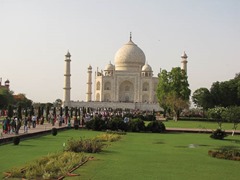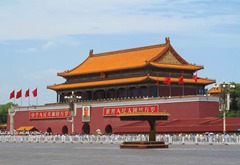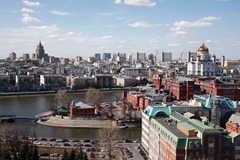Export outlooks: India, China and Russia
Three speakers shared their insights into travelling and doing business in India, Russia and China at the Northern Ireland Economic Conference.
 India: contrasts and signs of progress
India: contrasts and signs of progress
Journalist Oliver Balch is the author of ‘India Rising: Tales from a Changing Nation’. However, just after the book was published, the IMF lowered its growth forecast for India and Katherine Boo published ‘Behind the Beautiful Forevers’ which tells the story of slum dwellers. On his own work, Balch says: “The premise of the book isn’t that India is surging ahead but it is in a period of massive transition.”
After independence in 1947, the Indian Government chose protectionism and import substitution. The result was state-owned monopolies, corruption and stagnation. India opened up more of its economy to the market in the 1990s. Balch first visited India as an English teacher during that time but found that growth was “petering out” when he returned in 2011. Emerging markets are, by their nature, volatile and his hunch is that India is “over time moving upwards.”
India’s advantages include the English language, the personal drive of individual Indians and its reputation for entrepreneurship.
The greatest change that he had seen was that young people had bigger dreams and the courage to pursue them. Many of them, though, will remain poor and let down by the education system and caste.
Around half the population (600 million people) is aged under 25: “If India gets it right, this so-called demographic dividend could become the source of new jobs and increased productivity.” Massive unemployment was the risk if India got it wrong. The country needs to create 10 million new jobs every year just to keep its employment rate steady.
Balch saw opportunities in consumer goods, electronics, automotives and green tech. India is also “desperately in need of world class financial and legal services”. Low cost airlines can take business travellers to smaller, more isolated locations but the surrounding roads are generally still poor.
Indian business is still very hierarchical. Staff still call their immediate boss: “Sir.” The set answer is “yes to everything” and any data coming out of India need to be triple-checked for accuracy. “Time isn’t respected in quite the same way,” Balch noted.
“So expect people to turn up late and the more important they are, the later they’re likely to be.” Senior managers tend to use mobile phones rather than emails but will only give their numbers out if an investor has built up a rapport.
David Simms is sales and marketing director with Yelo, a manufacturer of automated testing equipment based in Carrickfergus. China, he relates, has around 20 Silicon Valley-type R&D hubs. Universities lose their R&D budgets if they cannot produce commercially viable products.
China isn’t a communist society: “They’ve been traders for years. They all have a second job or second interest and business is their main hobby.” Yelo started its research online and by reading the Chinese trade press. The company then approached Invest NI’s overseas market intelligence service. Through this service, UK Trade and Investment staff will go out and call customers on a company’s behalf: “We’ve had nothing but success with them because we’ve told them exactly what we want.”
Yelo also attended trade shows in the USA and China and travelled on trade missions with Invest NI. Building relationships is very important for closing deals with Chinese clients. They will maybe talk business after three dinners and will want to meet up very often. Last year, he undertook six weeklong trips to the country.
The company uses its distributor for all in-depth Chinese negotiations. Buyers typically want to see a 20 per cent discount so this needs to be marked up before going out there.
It’s important to check the legal terms for consequential losses. If equipment causes a financial loss to the customer, the supplier can be sued. Professional indemnity and product liability insurance should also be checked.
Olga Ponomarenko, an analyst for the European Bank for Reconstruction and Development (EBRD), recounted some reasons for Russia’s slowdown. It registered 1.5 per cent growth last year in contrast to 7 per cent growth before the economic crisis.
In the EBRD’s analysis, much of the growth has been “artificial” and dependent on high oil prices, financial services and trade. Agriculture, industry and construction were “ignored” by comparison.
Hydrocarbons still make up more than half of Russian exports. “Everybody’s talking about diversification but there does not seem to be any progress here,” she commented. Good working hours and stable wages attract most graduates into government posts and state-owned firms. SME owners are cautious about growing as that may attract extra taxation. Corruption is common.
Unemployment has reached an historic low (5 per cent) but many employers report skills shortages. Immigration rules make it easy to recruit a low-skilled worker from central Asia but harder to bring in a competent manager from western Europe.
On one positive note, the absence of Russian companies in Northern Ireland suggests that local companies can help them to communicate better e.g. by building English language websites. Ponomarenko therefore encourages companies in similar sectors to co-operate along these lines.







